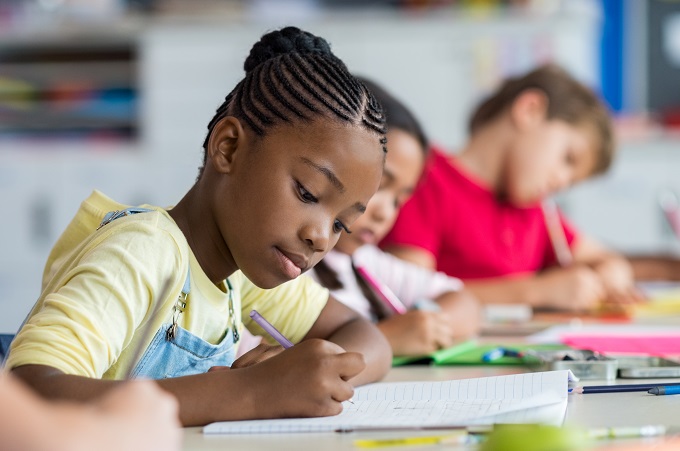
In the vast landscape of youth expression, there are moments that stand out for their candidness, boldness, and sharp astuteness, reflecting an unflinching instance of truth-tellin’.
One such occurrence comes from the journal entry of King Johnson, a second-grade African American student from Chicago, IL. Dated January 22, 2018, King used his entry not only to share how official school curriculum can be meaninglessly disconnected from ones’ lived reality, but also to serve as a courageous act by challenging racially inaccurate historical narratives passing as doctrine.
Today was not a good learning day. blah blah blah i only wanted to hear you not talking. You said something wrong and i can’t listen when i hear lies. My mom said that the only christofer we actnokledje is Wallace. Because Columbus didn’t find our country the Indians did. I like to have columbus day off but I want you to not teach me lies. That is all. My question for the day is how can white people teach black history? King Johnson
In response to King’s journal entry, his teacher wrote, “King, I am very disappointed in your journal today.”
To which King replied, “ok.”
In just seven sentences, King communicates a multifaceted critique. He questions the veracity of the information presented, asserts his community's knowledge on history, affirms his community cultural wealth, and challenges the authority of who is allowed to deliver content.
On its own, King's writing resists what scholars call curriculum violence—the deliberate manipulation of academic programming that compromises learners' intellectual and psychological well-being.
Leveraging literacy against racial injustice
King's act of truth-tellin' is a testament to the transformative potential of literacy, extending beyond the realms of the classroom and the school building. We see his expressive act as a means of survival for his intellectual, psychological, and spiritual well-being. His claim of learning disappointment and desire for more accurate historical information reflects a genuine curiosity to understand the world around him.
For literacy educators, these moments offer us thought-provoking opportunities to reconsider learning, teaching, curriculum, identity, and the important role of youth expression. King is not the only youth who sits in classrooms yearning for more authentic forms of learning engagement. How we respond to expressions such as his determines whether our classrooms strip individuals of their humanity, dignity, and sense of belonging.
Offering students safe spaces for expression, such as journals, affords classroom teachers the chance to cultivate intellectual risk-taking and foster emerging understandings where diverse perspectives and voices are seen, heard, felt, and dignified. It is in these spaces that teachers can promote brave critical thinking, support multi-narrative cultural awareness, and nurture a sense of individual and collective agency among our students.
Buttressed by King’s words, literacy educators should be fearless regarding our practice as stewards of literacy learning by reflecting upon a set of related compelling questions:
- When and where do we encourage young learners to write about race and racial injustice on their terms?
- How can literacy learning environments foster bravery and empower students to engage in their own truth-tellin’ by addressing witnessed or experienced forms of oppression?
- How do we create and hold space that invites youth to draw from their experiences and ideas to collaborate in redressing racial inequity for more just communities?
Our invitation to write toward justice
As part of a groundbreaking collaboration between the International Literacy Association (ILA) and the American Educational Research Association (AERA), K–12 teachers worldwide are invited to participate in a unique writing project that encourages youth to share their experiences, insights, and expertise on racial injustices and strategies for redress by responding to some carefully crafted prompts.
School-based educators are invited to submit student responses to these prompts by February 16, 2024, for potential inclusion in a session at the 2024 AERA conference, to be held in Philadelphia, PA, this April.
Prompts for students ages 5–11
Prompts for students 12+
The goal of the project is to center the thoughts and voices of young people, showcasing the ways in which racial inequity and other intersectional forms of oppression operate in their lived realities, while also illuminating the courageous and creative ways youth imagine and participate in acts to promote a more just world.
This collaborative effort seeks to leverage the combined educational resources of ILA and AERA to champion the empowerment of youth by providing them with a platform to speak their truth and contribute to conversations about racial justice.
By amplifying their perspectives and voices, we aim to support a generation that is unafraid to tackle systemic issues they have inherited but refuse to perpetuate. This endeavor is a special occasion for our young people to further become agents of change, using their literacy skills to navigate and reshape the world around them.
We are confident that this writing project has the potential to be a life-changing experience, shaping perspectives, fostering empathy, and contributing to a more equitable and just society. Let us collectively, as youth and literacy educators, embark on this journey, where literacy works as a verb becoming a tool for liberation and social transformation.
Together, our impact can be lasting, one truth-tellin’ writing entry at a time.
Jevon D. Hunter is the Woods-Beals Endowed Chair for Urban Education and interim associate dean for the School of Education at SUNY Buffalo State.
Patricia A. Edwards, a past president of the International Reading Association (now International Literacy Association), is a professor of language and literacy in the Teacher Education Department at Michigan State University.
Disclaimer: The viewpoints expressed in blog posts on this website are those of the individual writers and do not necessarily reflect the views of ILA. We have taken reasonable steps to ensure the accuracy of the information contained in blog posts but do not warrant the accuracy or completeness of such information.